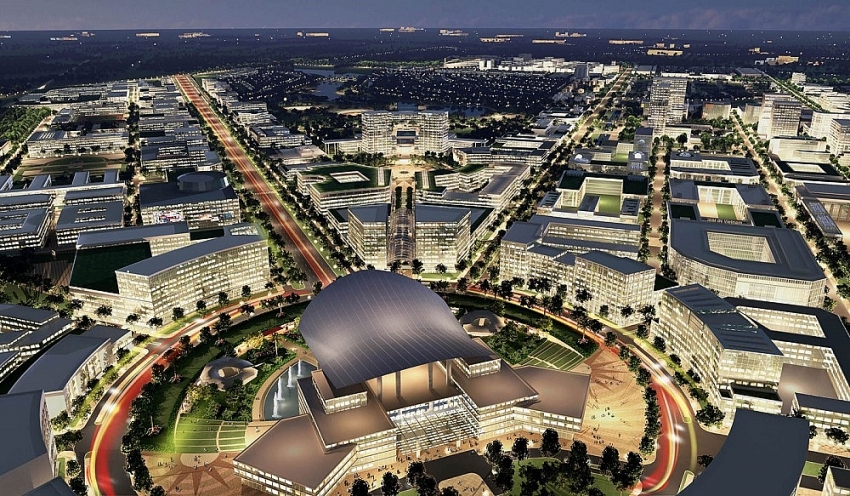Calling for investing in Ho Chi Minh City innovative urban area
 |
| Ho Chi Minh City's innovative urban area will be the next step towards becoming a smart city |
Three important functions
Discussing with investors, businesses at Ho Chi Minh City Economic Forum 2018 (HEF 2018) with the theme “Fostering interactive and innovative districts: the prominent role of businesses,” Nguyen Thanh Phong, Chairman of the Ho Chi Minh City People’s Committee, said that the innovative urban area will be a centre for research and application of science and technology, as well as high-quality education and training, and manufacturing and trading high-tech products.
Innovative urban areas will contribute to the establishment of value-added chains (basic scientific research, applied research, human resources training, product design, product sales, and service supply) by utilizing high-technology, technical infrastructure, and the principles of a modern society in accordance with international standards.
To achieve this purpose, Phong also added that it is necessary to form a network of leaders of organisations, enterprises, institutes, and schools, together with leaders of state management agencies to officially co-operate in programme formulation, distribution, marketing, and administration. In addition, leaders need to have a vision in all three areas of economic and social development; talent attraction; using technology to create a high-quality platform for innovative companies.
This innovative urban area will become the core of the Fourth Industrial Revolution and will be the basis for the city's smart urban development.
According to Phong, this innovative urban area will be built in the city’s eastern part, including District 2, District 9, and Thu Duc district.
Priority for private investment
Le Thanh Liem, Deputy Chairman of the Ho Chi Minh City People’s Committee, stated that building the innovative urban area would be the fulcrum of the city’s and nearby provinces' economic development.
“The city government hopes that local and international businesses will invest in innovative urban areas to create high-value products,” said Liem.
At the forum, Ousmane Dione, the World Bank’s country director for Vietnam, said that in order to promote the role of the innovative urban area, besides establishing closer linkages with surrounding provinces such as Dong Nai and Binh Duong, Ho Chi Minh City needs to have policies to attract, retain, and develop talent. At the same time, technical development, upgrading skills, and creating an environment that is attractive to businesses are also important. In addition, it is necessary to establish relations between the leaders and the community to share knowledge and information.
Meanwhile, Ahmad Magard, the Singapore Manufacturing Federation (SMF)’s general secretary highlighted the importance of private investment. “It is necessary to have specific preferential policies such as tax incentives in place to help private enterprises invest and link up with institutes and schools to innovate in technology,” Ahmad Magard said.
Talking to VIR, Le Hoai Quoc, head of the management board of Saigon Hi-Tech Park (SHTP) supposed that Ho Chi Minh City lacks mechanisms to connect scientists and enterprises.
Therefore, SHTP and functional authorities are actively advising the city to build a research institute to strengthen the link between scientists and businesses. At present, a foreign partner Korea Institute of Industrial Technology (KITECH) is ready to co-operate with SHTP to implement this project.
What the stars mean:
★ Poor ★ ★ Promising ★★★ Good ★★★★ Very good ★★★★★ Exceptional
Related Contents
Latest News
More News
- Vietnamese businesses diversify amid global trade shifts (February 03, 2026 | 17:18)
- Consumer finance sector posts sharp profit growth (February 03, 2026 | 13:05)
- Vietnam and US to launch sixth trade negotiation round (January 30, 2026 | 15:19)
- NAB Innovation Centre underscores Vietnam’s appeal for tech investment (January 30, 2026 | 11:16)
- Vietnam moves towards market-based fuel management with E10 rollout (January 30, 2026 | 11:10)
- Vietnam startup funding enters a period of capital reset (January 30, 2026 | 11:06)
- Vietnam strengthens public debt management with World Bank and IMF (January 30, 2026 | 11:00)
- PM inspects APEC 2027 project progress in An Giang province (January 29, 2026 | 09:00)
- Vietnam among the world’s top 15 trading nations (January 28, 2026 | 17:12)
- Vietnam accelerates preparations for arbitration centre linked to new financial hub (January 28, 2026 | 17:09)

 Tag:
Tag:























 Mobile Version
Mobile Version